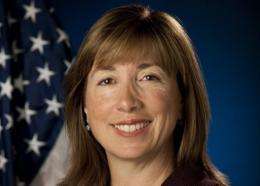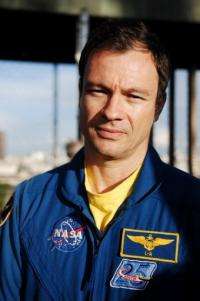NASA says competition is key to private space race

Competition is vital to the race among private companies to replace the space shuttle, NASA said Thursday, after Congress called for the US space agency to fund a single company.
"We believe that competition is key to accelerating this program," said NASA deputy administrator Lori Garver in a conference call with reporters.
"We are ushering in a new era that embraces the innovation of the private sector along with the importance of what we do here in the government."
The renewed debate over how to quickly restore US access to the International Space Station following the shuttle's retirement comes as California-based SpaceX is preparing for its first cargo test flight to the orbiting lab on Saturday.
But with plans for a crew-capable spacecraft not expected before the 2015-2017 timeframe, and NASA pouring hundreds of millions of dollars in seed money into four private companies, some lawmakers have urged a narrower process.
The House of Representatives last week passed a bill that calls on NASA to make an immediate choice of one company for the commercial crew funding it plans to distribute later this year, expected to be around $500 million.
Last year, NASA's Commercial Crew Development program gave nearly $270 million to four companies: Blue Origin ($22 million), Boeing ($92.3 million), SpaceX ($75 million), and Sierra Nevada ($80 million).
Congressman Frank Wolf, a Republican from Virginia and chairman of the House Appropriations subcommittee that oversees NASA's budget, said last week the current approach "runs a high risk of failure" by funding numerous companies.
The scheme makes it likely to leave the "taxpayer with no tangible benefits in exchange for a substantial investment," he added.

The Senate would have to approve the bill for it to take effect, but NASA bristled at the suggestion that less competition would be more cost-effective.
"Obviously, while we believe in competition, we recognize that we are to the point now where we want to have the most realistic and the best chance of success at meeting our goals to be transporting astronauts to the International Space Station as soon as possible," Garver said.
When awards are decided on this year, NASA hoped the selection would allow that "to happen in the very soonest timeframe while keeping some competition," she added.
SpaceX is clearly in the lead among its competitors. Its upcoming cargo test flight uses the Dragon space capsule that is also built to carry up to seven crew.
Sierra Nevada is also poised to start localized tests of its Dream Chaser vehicle this month. And Orbital Sciences Corporation, which has a separate contract with NASA for cargo missions to the ISS, is expected to do a test launch later this year.
"The first to market doesn't always win either so there are a lot of interesting times ahead," said Jeff Greason, president of XCOR Aerospace and an executive committee member of the Commercial SpaceFlight Federation.
Greason lamented the high cost of paying Russia $63 million dollars a seat so US astronauts can hitch a ride to the ISS, a cost that the United States began paying once the 30-year space shuttle program ended in 2011.
"Relying on the Soyuz or any sole system as the only means of transport to the ISS isn't wise. The Soyuz has been a great spacecraft but the Russians are not immune to hardware problems," he said.
Former NASA astronaut and president of the Commercial Spaceflight Federation Michael Lopez-Alegria said that reducing competition now would raise prices, not lower them.
"Once you get out of the competition phase, you start getting into monopoly pricing and not only is it going to cost more but it is going to take longer," he told reporters.
"So we need to resist the temptation of saying, 'If we want to have it sooner we should just throw money at less companies because they'll have more money to go faster.' That is not the path to success."
In the meantime, Lopez-Alegria said he and many others will be closely watching SpaceX's cargo attempt, scheduled to lift off Saturday at 4:55 am (0855 GMT).
"It is by all accounts an important step, bordering on a giant leap for commercial spaceflight," he said.
"Although SpaceX's efforts are in today's spotlight, they are but one player on a team that is fully engaged in reducing the cost of access to space for people and payloads."
(c) 2012 AFP





















